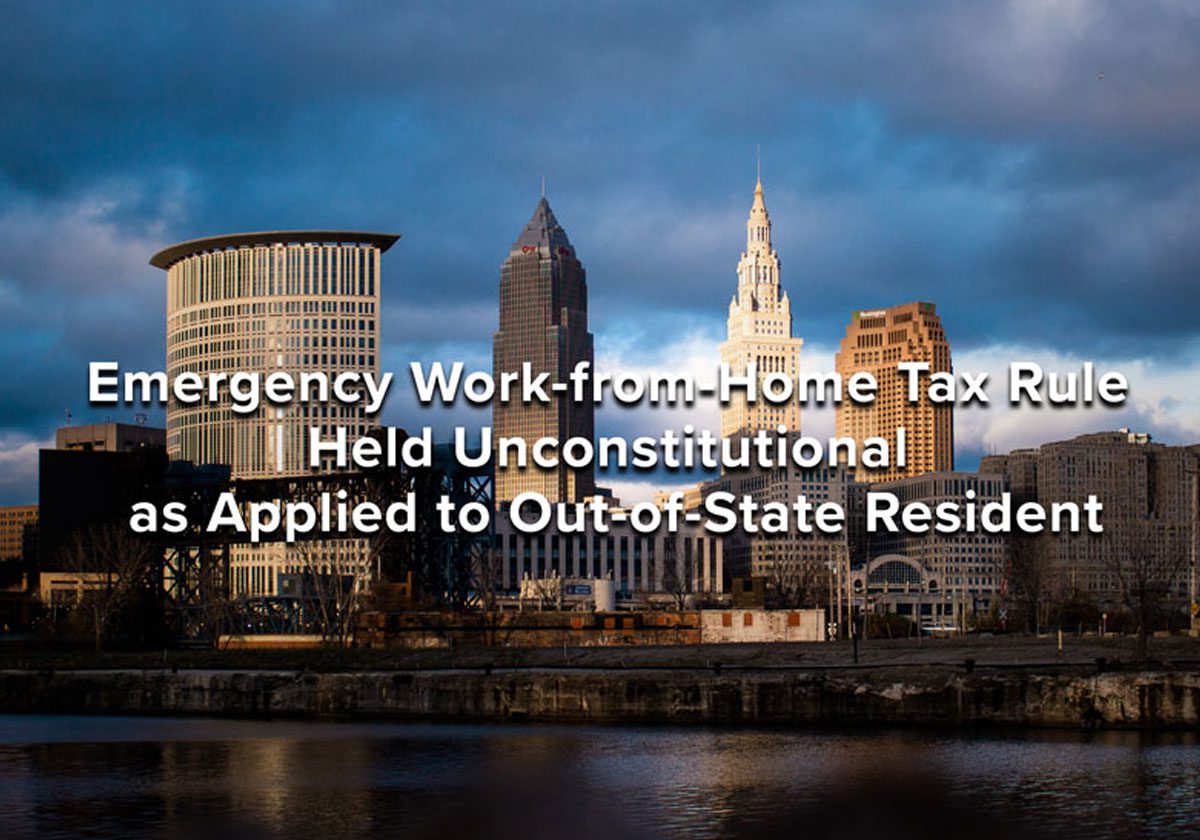Challengers to Ohio cities’ interpretation of the emergency withholding tax rule from 2020 have won a victory in court. On September 26, 2022, in Morsy v. Dumas, Case No. CV 21 946057, the Cuyahoga County Court of Common Pleas granted the motion for summary judgment of Dr. Manal Morsy, who worked from home in Pennsylvania from March 12, 2020 through the end of the year, but had income tax withheld to Cleveland as a consequence of Section 29 of H.B. 197 (“Section 29”).
Section 29 was the tax withholding section of the Ohio General Assembly’s Covid-19 emergency legislation enacted near the beginning of the pandemic. The SALT Buzz has reported on other challenges to Ohio cities’ interpretation of this legislation, most recently here. Of the multiple challengers to the cities, Morsy is the first to win in court. This did not result from a novel legal analysis performed by the Cuyahoga County court, however, but from Dr. Morsy’s particular fact scenario. Unlike the other challengers thus far, Dr. Morsy’s home, where she performed her work during the pandemic, is not merely outside the city that was her primary place of work prior to the pandemic, but outside the state of Ohio.
In the opinion accompanying the judgment entry in favor of Dr. Morsy, the court concluded that Section 29 is not facially unconstitutional; the court does not appear to disagree with the holdings it cites from the Tenth and First Districts in Buckeye Institute v. Kilgore, 2021-Ohio-4196, and Schaad v. Alder, 2022-Ohio-340, respectively. Buckeye held that Section 29 was a limitation on municipal taxing authority (the plaintiff there had argued it was an unconstitutional expansion of such authority) and the General Assembly was within its authority to pass it as an emergency law “necessary for the immediate preservation of the public peace, health or safety” as allowed by Article II, Section 1d of the Ohio Constitution. The Schaad decision added that the city was required to follow the dictates of Section 29 as a uniform taxation scheme created by the General Assembly, and the taxpayer, as a resident of Ohio, was properly subject to that scheme as well. (In Schaad, the taxpayer’s appeal is currently pending before the Ohio Supreme Court, case No. 2022-316.) Thus, the court in Morsy concluded that Section 29 on its face is not clearly incompatible with the specific authorities granted the General Assembly by the Ohio Constitution.
The Morsy court held, however, that “while the Ohio General Assembly has jurisdiction over Ohio residents and authority to deal with the exigencies of the pandemic, it cannot create jurisdiction to levy a tax on the income of persons who are not residents of Ohio, and that was earned for work performed outside the State of Ohio.” In reaching this conclusion, the Morsy court relied heavily on the Ohio Supreme Court’s decision in Hillenmeyer v. Cleveland Bd. of Rev., 144 Ohio St.3d 165, 2015-Ohio-1623. The Morsy court disagreed with the City of Cleveland’s argument that the taxpayer, while working remotely, was “delivering her work into Cleveland, using facilities maintained by her employer, and that the City of Cleveland provides services and protections to her employer’s offices and the infrastructure that allows the Plaintiff to remotely connect to resources she needs to do her job from Pennsylvania.” Instead, the court concluded, “The ability of an employee to communicate virtually with her office and to perform her job duties from home does not create the fiscal relation required by the case law” dealing with the due process limits on state and local income taxation. In the absence of a judicially accepted theory of virtual jurisdiction, neither Cleveland nor the State of Ohio have jurisdiction to tax a nonresident of Ohio on income from work performed outside Ohio.
On October 19, 2022, the city appealed the decision to the Eighth District Court of Appeals, case No. CA-22-112061, and the city also moved for a stay of the decision in the trial court.
If you would like to discuss municipal tax issues, please contact Derek Heyman, Tom Zaino, Steve Hall, or any other ZHF professional.


